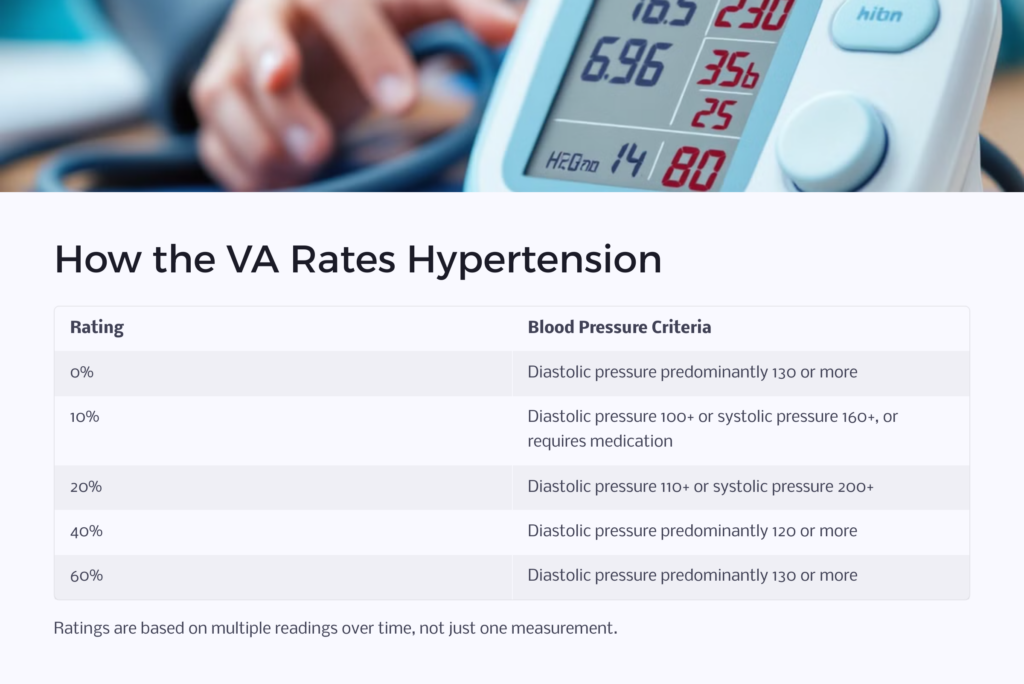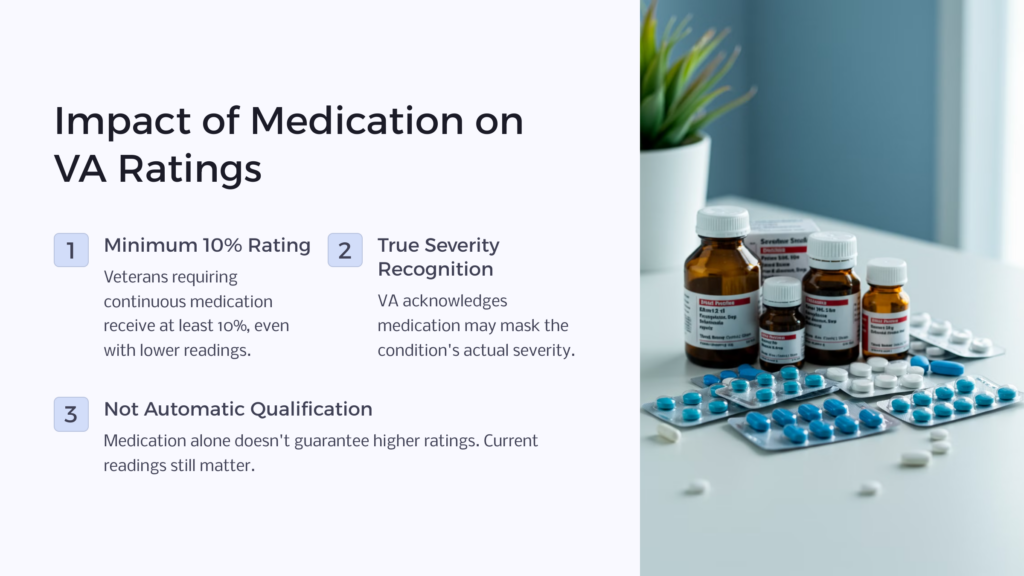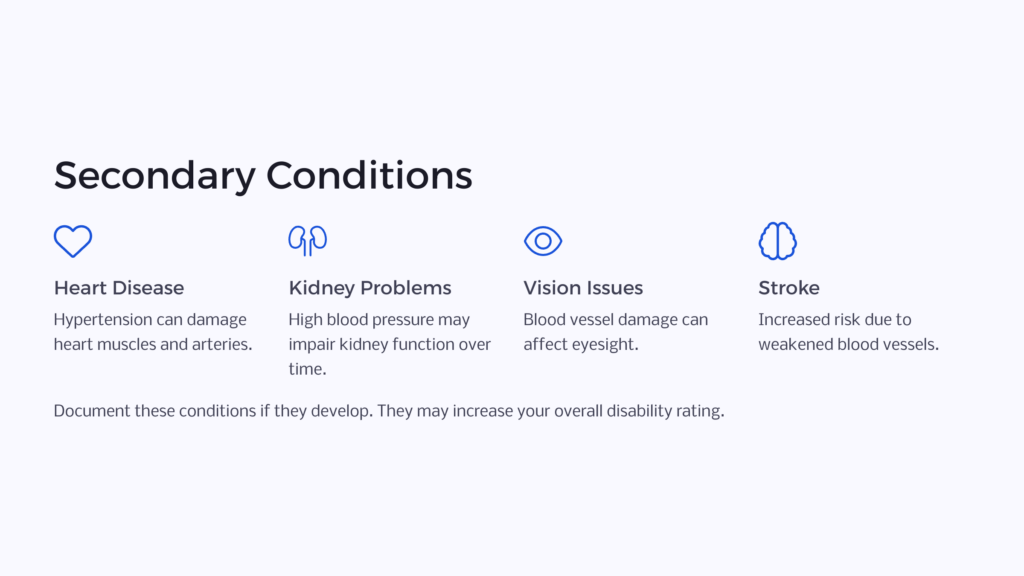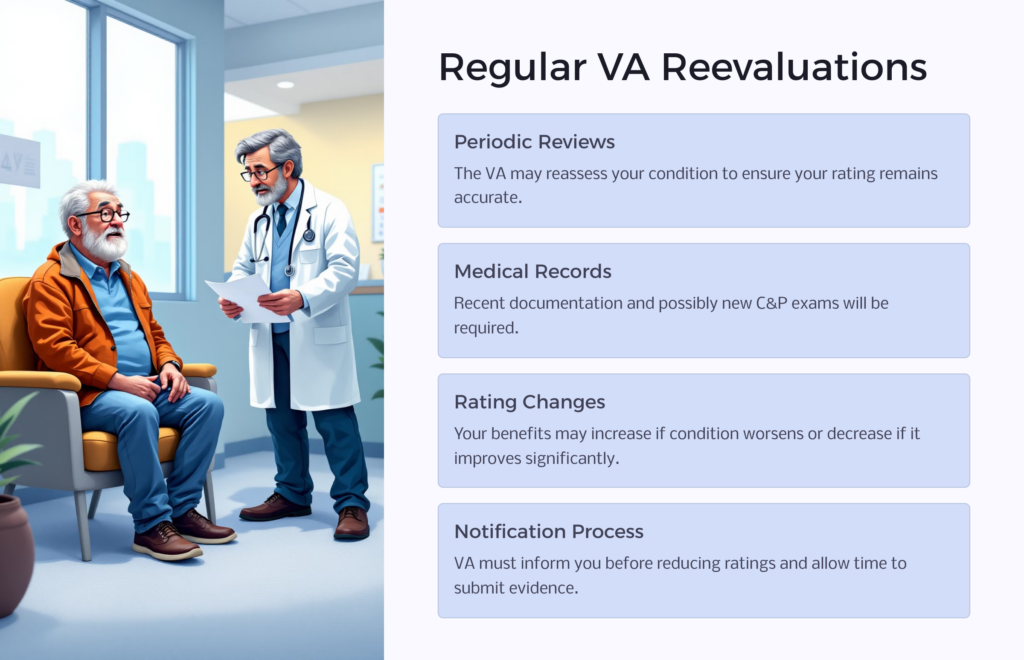Hypertension, commonly known as high blood pressure, is a prevalent condition among veterans. The Department of Veterans Affairs recognizes this and provides disability compensation for those affected. If you’re a veteran with hypertension and take medication, it’s helpful to understand how the VA rates this condition.
The VA uses a specific rating system to determine the severity of hypertension and the corresponding disability compensation. This system takes into account both your blood pressure readings and the need for medication to control your condition. Let’s dive deeper into how the VA evaluates hypertension and what you need to know about the rating process.
How the VA Rates Hypertension

The VA rates hypertension based on the severity of your condition. They use a scale from 0% to 60%, with higher percentages indicating more severe hypertension. The ratings are primarily determined by your blood pressure readings, but the need for medication is also considered.
Here’s a breakdown of the VA rating scale for hypertension:
- 0%: Diastolic pressure predominantly 130 or more
- 10%: Diastolic pressure predominantly 100 or more, or systolic pressure predominantly 160 or more, or minimum evaluation for an individual with a history of diastolic pressure predominantly 100 or more who requires continuous medication for control
- 20%: Diastolic pressure predominantly 110 or more, or systolic pressure predominantly 200 or more
- 40%: Diastolic pressure predominantly 120 or more
- 60%: Diastolic pressure predominantly 130 or more
It’s important to note that these ratings are based on multiple blood pressure readings taken over time, not just a single measurement.
The Impact of Medication on VA Ratings

If you’re taking medication to control your hypertension, this can affect your VA rating. The VA recognizes that medication can lower your blood pressure readings, potentially masking the true severity of your condition.
For this reason, the VA provides a minimum 10% rating for veterans who require continuous medication to control their hypertension, even if their current blood pressure readings fall below the 10% criteria. This ensures that veterans receiving treatment are still eligible for compensation.
However, it’s crucial to understand that simply being on medication doesn’t automatically qualify you for a higher rating. The VA will still consider your blood pressure readings while on medication when determining your overall rating.
Documenting Your Hypertension for VA Rating
To ensure you receive the appropriate VA rating for your hypertension, proper documentation is key. Here are some steps you can take:
- Keep a record of all your blood pressure readings, including those taken at home and during medical appointments.
- Maintain a list of all medications you’re taking for hypertension, including dosages and any changes over time.
- Attend regular check-ups with your healthcare provider and ensure they document your blood pressure readings and medication adjustments.
- If you experience any symptoms related to your hypertension, such as headaches or dizziness, make sure these are noted in your medical records.
By keeping thorough records, you provide the VA with a comprehensive picture of your condition, which can help ensure an accurate rating.
Secondary Conditions and Hypertension

Hypertension can lead to or worsen other health conditions. The VA recognizes this and may provide additional compensation for secondary conditions related to your hypertension. Some examples of secondary conditions include:
- Heart disease
- Kidney problems
- Vision issues
- Stroke
If you develop any of these conditions as a result of your hypertension, it’s important to document this and inform the VA. This could potentially increase your overall disability rating and compensation.
Appealing Your VA Rating for Hypertension on Medication
If you believe your VA disability rating for hypertension doesn’t accurately reflect the severity of your condition, you have the right to appeal. The appeals process allows you to present additional evidence and argue for a higher rating.
To appeal, you can:
- File a Notice of Disagreement (NOD) within one year of receiving your rating decision
- Submit new and relevant evidence to support your claim
- Request a hearing with a VA official to present your case
Remember, the appeals process can be complex, so consider seeking assistance from a Veterans Service Organization (VSO) or a VA-accredited attorney.
Managing Your Hypertension While on VA Disability
Receiving a VA rating for hypertension on medication doesn’t mean you should stop managing your condition. Continued care is crucial for your health and can help prevent complications. Here are some tips for managing your hypertension:
- Take your medication as prescribed
- Monitor your blood pressure regularly at home
- Maintain a healthy diet low in sodium and high in fruits and vegetables
- Exercise regularly, as approved by your doctor
- Limit alcohol consumption and quit smoking if you do
- Attend all scheduled medical appointments
By actively managing your hypertension, you not only improve your health but also ensure that your VA rating remains accurate over time.
The Importance of Regular VA Reevaluations

The VA may periodically reevaluate your hypertension to ensure your rating remains accurate, and your disability benefits may change accordingly. These reevaluations are important because your condition may improve or worsen over time.
During a reevaluation, the VA will review your recent medical records and may schedule you for a new Compensation and Pension (C&P) exam. It’s crucial to attend these appointments and provide updated information about your condition.
If your hypertension has worsened, a reevaluation could result in an increased rating. Conversely, if your condition has improved significantly, your rating might be reduced. However, the VA must follow specific procedures before reducing a rating, including notifying you and allowing you to submit evidence.
Navigating VA Ratings for Hypertension on Medication
Understanding your VA rating for hypertension while on medication can be complex, but it’s essential for ensuring you receive the appropriate compensation for your condition. Remember that the VA considers both your blood pressure readings and your need for medication when determining your rating.
By keeping accurate records, attending regular medical appointments, and actively managing your condition, you can help ensure your VA rating accurately reflects the severity of your hypertension. If you believe your rating is incorrect, don’t hesitate to appeal or seek assistance from a VSO.
Ultimately, the goal is not just to secure the right VA rating, but also to manage your hypertension effectively for your long-term health and well-being. With the right approach, you can navigate the VA system, receive the disability benefits you need, and take care of your health.
At Benefits.com, we aim to point you in the right direction towards all the benefits available to you. Take our free eligibility quiz today to get started!
 Benefits.com Advisors
Benefits.com Advisors
With expertise spanning local, state, and federal benefit programs, our team is dedicated to guiding individuals towards the perfect program tailored to their unique circumstances.
Rise to the top with Peak Benefits!
Join our Peak Benefits Newsletter for the latest news, resources, and offers on all things government benefits.




















